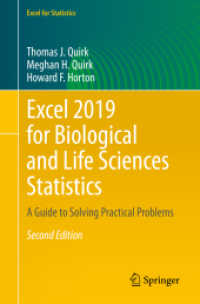- ホーム
- > 洋書
- > 英文書
- > Psychology
Full Description
The fifth edition of Educational Measurement represents the first version of this volume produced solely by the National Council on Measurement in Education (NCME). This volume, like the previous four editions, provides cutting edge research and guidance on all major topics in the field of measurement science, with chapters written by acknowledged experts in their respective fields.
Edited by Linda L. Cook and Mary J. Pitoniak, this edition contains 21 chapters separated into four parts. Part I provides a framing chapter for the volume, as well as chapters on the history of educational measurement and the sociocultural context of educational assessment. Part II addresses the foundational topics of validity and validation; reliability; and fairness theory and concepts. Part III includes new theories and technical advances in topics such as designing and developing assessments; test administration and scoring; technology-based assessment; modeling educational assessment data; scaling, equating and linking; standard setting; score reporting; and fairness through accessibility for all test takers and specific groups. Part IV includes chapters on assessment to inform teaching and learning; test-based accountability in K—12 education; assessment for higher education; licensing and certification assessment; assessment of interpersonal and intrapersonal skills; and large-scale assessments in international contexts. Part V provides an extensive discussion on the nature of measurement.
This is an open access title available under the terms of a CC BY-NC-ND 4.0 license. It is free to read at Oxford Scholarship Online and offered as a free PDF download from OUP and selected open access locations.
Contents
List of Tables
List of Figures
Foreword
Acknowledgments
Contributor List
Part I: Setting the Context
1. Factors Influencing Education and Educational Measurement
Linda L. Cook and Mary J. Pitoniak:
2. The History of Educational Measurement
Brian E. Clauser, Jerome C. Clauser, and Amanda L. Clauser:
3. The Sociocultural Context of Educational Assessment
Kadriye Ercikan and Guillermo Solano-Flores:
Part II: Foundational Concepts
4. Validity and Validation
Suzanne Lane and Scott F. Marion:
5. Reliability in Educational Measurement
Won-Chan Lee and Deborah J. Harris:
6. Fairness in Educational Measurement: Theory and Concepts
Rebecca Zwick:
Part III: Developing, Administering, and Scoring Assessments
7. Designing and Developing Educational Assessments
Kristen Huff, Paul Nichols, and M. Christina Schneider:
8. Test Administration and Scoring
Mark D. Shermis, Allan S. Cohen, and Jordan M. Wheeler:
9. Technology-Based Assessment: Validity, Modeling, and Analysis Issues
Randy E. Bennett, Michelle LaMar, and John Mazzeo:
10. Modeling Data from Educational Assessments
Li Cai, Mark Hansen, Minjeong Jeon, and Michael C. Edwards:
11. Scaling, Equating, and Linking
Tim Moses:
12. Standard Setting: A Cognitive and Social Model
Steve Ferrara, Susan Davis-Becker, Priya Kannan, and Katherine Reynolds:
13. Reporting Scores and Other Results
April L. Zenisky, Francis O'Donnell, and Ronald K. Hambleton:
14. Realizing Fairness Through Accessibility for All Test Takers and for Specific Groups
Michael C. Rodriguez and Martha L. Thurlow:
Part IV: Specific Applications of Assessment
15. Assessment to Inform Instruction and Learning
Susan M. Brookhart and Charlie DePascale:
16. Test-Based Accountability in KDL12 Education
Andrew D. Ho and Morgan S. Polikoff:
17. Assessment for Admission, Placement, and Outcomes in Higher Education
Wayne J. Camara, O. Lydia Liu, and Krista Mattern:
18. Assessment for Licensing and Certification
Melissa J. Margolis, Rebecca S. Lipner, and Chad W. Buckendahl:
19. Assessment of Social-Emotional, Soft, Character, Behavioral, and Intrapersonal and Interpersonal Skills
Patrick C. Kyllonen and Jiyun Zu:
20. Large-Scale Assessments in International Contexts
Henry I. Braun and Irwin Kirsch:
Part V: Measurement As a Science
21. On the Nature of Measurement
Derek C. Briggs, Andrew Maul, and Joshua A. McGrane:








